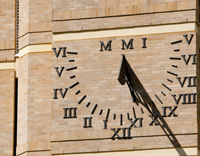Classical Mechanics and Special Relativity - PHYS2113
Description
Classical mechanics is the study of the motion of objects obeying Newton’s laws of motion, while Einstein’s special theory of relativity revises the Galilean notion of relativity between inertial frames. This course aims to introduce students to the elegant Lagrangian and Hamiltonian formulations of Newtonian mechanics, and the fundaments of special relativity and the associated 4-formalism. Students will receive a strong grounding in these methods, paving the way for advanced topics in electrodynamics, quantum mechanics, and statistical mechanics. Topics to be covered include: Damped and forced harmonic oscillations and resonance phenomena. Central force problems and celestial orbits. Inertia tensor and rotational dynamics. Variational principles. Lagrangian and Hamiltonian formulations of mechanics. Noether’s theorem, symmetry and conservation laws. Coupled oscillators, normal modes, continuous systems and fields. Many-particle systems. Foundations of special relativity. 4-formalism. Lorentz transformation. Spacetime diagrams. Relativistic kinematics and dynamics. Relativistic Doppler effect.









